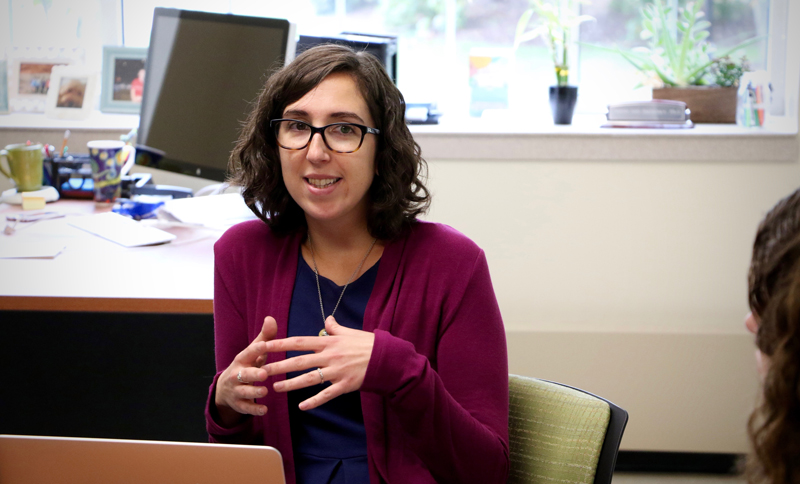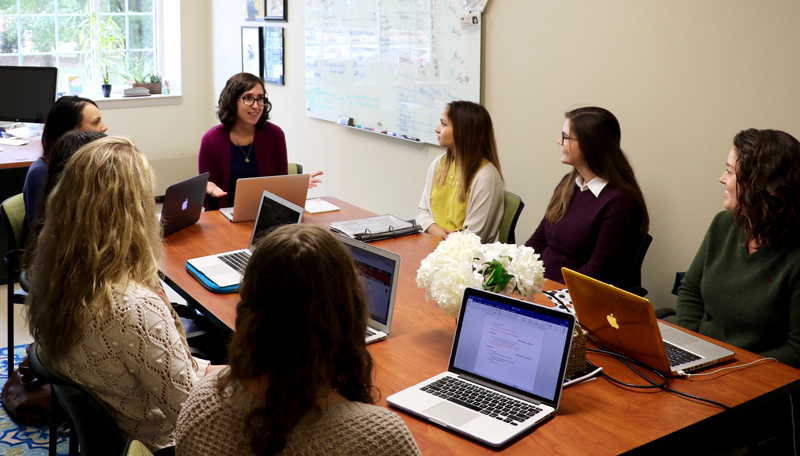


Sweeping away the stigma of HIV
Photo by Elizabeth Adams April 05, 2019
UD’s Valerie Earnshaw honored nationally for research on HIV stigma
She interviewed him at the methadone clinic. He had HIV and a heroin use disorder. Valerie Earnshaw, a professor at the University of Delaware, was in graduate school at the time, gathering data for her psychology research. What he told her will stay with her forever.
“He said doctors wouldn’t touch him in the early days of his HIV care, which made him feel awful,” Earnshaw says. “He said he would never forget the first time he was touched in a doctor’s office. Being touched in a positive way was such a humanizing experience.”
Then there was the 18-year-old receiving methadone who didn’t have much to say during his interview until Earnshaw asked, at the conclusion, if he had any questions.
“He asked me, ‘When will it end? My family — they don’t trust me. When will that wear off?’ I was heartbroken. I carry him with me, too,” she says.
Such discussions have steeled Earnshaw’s resolve to understand the stigma that people with HIV and substance use disorders face and to help bring about positive change. Although she has only been on the faculty of UD’s College of Education and Human Development since 2016, the social psychologist already is being recognized nationally for her research.
On March 27, at the headquarters of the National Institutes of Health in Bethesda, Maryland, Earnshaw delivered the Office of Disease Prevention’s Early Stage Investigator Lecture, an honor reserved for early career investigators who are poised to become future leaders in disease prevention research.
This summer in Chicago, she will receive the American Psychological Association’s 2019 Psychology and AIDS Distinguished Leadership Award, as an Emerging Leader, for her “contributions to understanding and addressing the mechanisms underlying HIV stigma through research, policy work and advocacy.”
Stamping out stigma
Throughout history, society has rejected certain groups for one reason or another. Consider those with leprosy in ancient times. The Irish when they first arrived in America. Kids in school from the “wrong side of the tracks.” The neighbor with mental illness.
According to the late scholar Erving Goffman, stigma is “a mark of tarnished character,” social devaluation and discrediting.
“There are actually several components to it,” Earnshaw says. “There’s labeling, stereotyping, separation, status loss and discrimination. When all of these things co-occur within a power context, this is when we have stigma. What’s interesting is that stigma is a social construct — something that people create — which means that we can change it.”

And that is what Earnshaw aims to do. One of her primary research contributions so far has been to differentiate how people with HIV experience stigma so that effective interventions can be developed. She measures “internalized stigma,” where people living with HIV believe the negative stereotypes — “I’m a bad person because I have HIV.”
“Enacted stigma” is being discriminated against, from experiencing violence to being refused health care, housing, a job. “Anticipated stigma” is where patients have not necessarily experienced stigma yet, but they expect they will in the future, which can lead to negative outcomes. A patient might be worried about telling her diabetes doctor she has HIV, for example, so she might not go to that doctor.
Countering stigma requires support from caring people. But getting that support has its risks. How will your mom accept your disease, your employer, a best friend?
Not long ago, one of Earnshaw’s friends confided in her that he was struggling with alcohol and undergoing treatment. Their discussion helped her think through an intervention to support disclosures that she’s now testing in partnership with nearby Brandywine Counseling Services in Newark.
Earnshaw is adapting a tool called CORAL (short for “Conceal or Reveal”), developed in the United Kingdom, to help people with substance use disorders decide if and how they should disclose their situation. The 30-minute intervention can be done within a counseling session. This May, thanks to her department and a UD GLOBEX grant, she will fly to London to meet CORAL’s originator, Claire Henderson, to learn more about adapting the intervention.
“If a patient reaches the end point and realizes ‘my aunt won’t accept this,’ then disclosing is probably not the best thing to do,” Earnshaw says. “If it’s a matter of ‘I want to let my boss know why I can’t be at work for the 6 a.m. shift — because I need to get my methadone in the morning — and, I think my boss gets it because she’s talked about how her son is in recovery’ … then disclosing might be a good thing to do.
“Stigma has happened forever,” Earnshaw says. “It’s an evolved human behavior and it’s really harmful. It’s a problem when we devalue and discredit people. It’s a problem when people are treated unfairly. But I’m looking forward to changing it.”
Change agent
Earnshaw’s interest in social equality began at an early age. When she was growing up, conversations around the family dinner table ventured far beyond a particular school project or the latest antics in gym class. Frequently, her dad, an enterprise architect and “armchair psychologist,” raised issues of discrimination, racism, the favored and the frowned-upon in the eyes of society.
With her mom a nurse, discussions about health and access to health care further stirred Earnshaw’s young mind and heart.
In college at Penn State, she signed up for a psychology lab and immediately felt at home. She loved being part of a science squad, working to uncover what motivates people to think the way they do. She went on to earn her doctorate in social psychology at the University of Connecticut, then pursued additional training at Yale, Harvard Medical School and Boston Children’s Hospital.
The training awards she received from NIH along the way have been “truly transformative,” she says, allowing her to apply her background in social psychology to HIV and substance use disorders. She’s had funding from the National Institute of Mental Health, the National Institute on Minority Health and Health Disparities and the National Institute on Drug Abuse.
Currently, Earnshaw is on sabbatical, working on projects locally and internationally. Last month, she flew to Indonesia and Malaysia. In Indonesia, she’s working to address stigma as a barrier to HIV disclosure among prisoners to sex partners in the community. In Malaysia, she’s collaborating with the president-elect of the International AIDS Society to reduce HIV stigma. A recent survey of medical students there revealed negative attitudes toward people with HIV, and she’s energized to effect change.
“UD’s Department of Human Development and Family Sciences has been the perfect fit for me because of the emphasis on interdisciplinary and applied research,” Earnshaw says. “Plus, all of my colleagues are social justice oriented. It’s a great place to be.”
Contact Us
Have a UDaily story idea?
Contact us at ocm@udel.edu
Members of the press
Contact us at mediarelations@udel.edu or visit the Media Relations website

